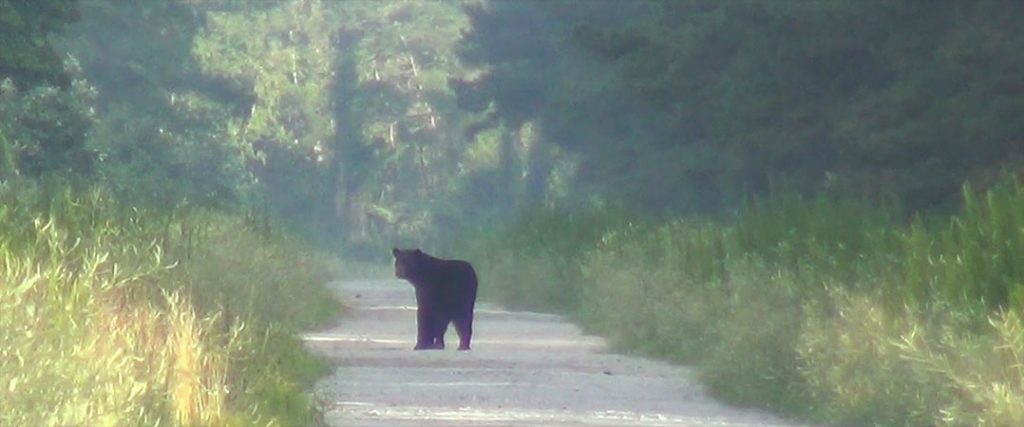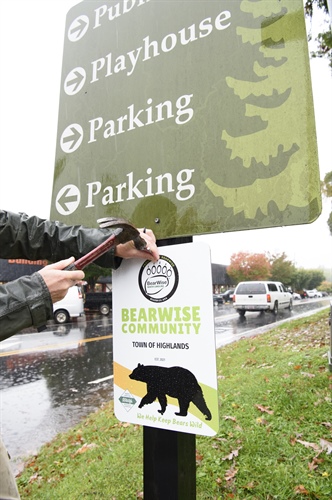
Reducing human-bear conflicts one community at a time
Sprawling development, increasing human populations, the desire to live and recreate in areas that were once remote, combined with the successful restoration of black bear populations by state wildlife agencies have resulted in more frequent sightings of bears, even in populous areas in the Southeastern United States. As the human footprint continues to expand into bear habitat, there is a growing need for people to share the land and avoid human-bear conflicts.

Recognizing this need, wildlife agencies throughout the southeast have been working together to develop a strategy for educating the public on best practices to coexist with black bears. In 2018, the 15 member states of the Southeastern Association of Fish and Wildlife Agencies launched BearWise®.
BearWise is a regional outreach effort to provide science-based resources and communicate consistent and effective messaging about how to live responsibly with black bears. BearWise encourages residents, businesses and entire communities to take actions to keep bears wild and people safe.
Securing attractants, such as garbage and bird feeders, is the most effective and long-term solution to preventing and resolving human-bear conflicts. As such, some states have adopted formal BearWise Community Recognition programs to encourage broad participation in reducing bear attractants. Communities in North Carolina, Tennessee and Florida are making the commitment to be BearWise, which is having a positive impact on bear conservation efforts.
In North Carolina, four communities in the western part of the state have achieved BearWise Community Recognition by the N.C. Wildlife Resources Commission (NCRWC). Residents of the Asheville neighborhoods of Mountain Meadows I & II, and the residents of downtown Black Mountain, decided that adopting the BearWise program was necessary after experiencing bears entering homes, getting into garbage and displaying habituated behavior. These communities now adhere to the Six BearWise Basics and remove attractants for at least two weeks after experiencing bear activity and secure their trash in their garages until the morning of collection day.
The small mountainous town of Highlands, North Carolina, population 1,200, took their BearWise commitment further and became the first town in the state to receive BearWise Community Recognition. The town’s Board of Commissioners, government officials and staff, law enforcement and volunteer Bear Education and Resources (B.E.A.R.) Task Force came together to pass two ordinances; a mandate that residents use bear-resistant garbage carts and an ordinance that prohibits both the intentional feeding of bears and leaving food, garbage or any other substance in any manner that attracts or allows bears access.
“Highlands community leaders didn’t just go halfway, they went all in,” said NCWRC Biologist Ashley Hobbs. “They are the gold standard and have laid the groundwork ensuring that the future of Highlands will always coexist with black bears.”
Highlands B.E.A.R. Task Force Chair Cynthia Strain said, “As soon as North Carolina started their BearWise program, we jumped on board. We’ve been doing programs, publishing brochures, articles in the newspapers and a whole lot in the last couple of years. I could not be prouder that we have got the town and the state all together to come to this moment.”
The Tennessee Wildlife Resources Agency (TWRA) is also focused on recruiting small, mountain towns for its BearWise Community Recognition program, specifically the gateway communities of the Great Smoky Mountains National Park.
“We are finalizing the details for our first BearWise communities and businesses and hope to have several programs up and running by spring when bears are active again, searching for food after winter hibernation,” said Dan Gibbs, black bear program leader with the TWRA.
Further south, the Florida Fish and Wildlife Conservation Commission (FWC) was working with communities even before the formalized BearWise Community Recognition program was in place. Four communities and one military base have achieved BearWise Community Recognition: Wingfield North and Wingfield Reserve in Logwood, Cypress Dunes in Santa Rosa Beach, and Stoneybrook in Estero have all met the six BearWise Basics, as well as passing ordinances requiring trash be kept secure from bears.
After elevated bear activity in the mid-2000s, U.S. Air Force Hurlburt Field in Okaloosa County, Florida consulted with the FWC to determine how to address human-bear conflicts. Hurlburt Field purchased bear-resistant trash cans for all on-base housing units and converted all dumpsters to keep bears out. Additionally, incoming personnel and their families are now provided with training on proper use of the trash cans and education about bears, what attracts them, and what to do if they see a bear. Allowing bears to access garbage while living in base housing is a violation of housing rules and is strictly enforced. Hurlburt Field Security Forces receive regular trainings from the FWC on how to respond to human-bear conflicts, including scaring bears with less-lethal methods. As a result of Hurlburt’s innovative efforts, human-bear conflicts on base dropped by 70% in 2013 after just over one year of these efforts. Hurlburt Field incorporated all of their BearWise efforts in the installation’s 2021 Integrated Natural Resources Management Plan, which further reinforces continuity and confirms the facility will continue to keep people safe and bears wild.
“The Hurlburt Field community is fortunate to have undeveloped areas on base and be bordered by the Eglin Reservation,” said Lieutenant Colonel Nicholas M. Pulire, Commander of the 1st Special Operations Civil Engineer Squadron, U.S. Air Force. “This gives the base a great natural feel and provides frequent opportunities to see bears and other wildlife in their natural habitat. To ensure the safety of our people and the bears we must do everything possible to avoid creating food attractants that alter bears’ natural behavior. By implementing BearWise practices we have eliminated attractants and as a result our human-bear conflicts have dropped dramatically.”
Unfortunately, not all communities have the same resources as Highlands or Hurlburt. There can be barriers to recognition, including income disparities, lack of an existing unifying structure (e.g., homeowner’s association) and residents’ varying willingness to change behavior and their perceptions of black bears. Making the BearWise Community Recognition program more accessible to a wide variety of communities is a priority of the program.
It’s important that residents, communities and businesses across the southeast realize the realities of human-bear interactions and proactively work to prevent conflicts from occurring in the first place. Prevention with programs like BearWise benefits people and bears in the long run.
To learn more about becoming a BearWise community, visit BearWise.org. More information about the NCWRC (ncwildlife.org), TWRA (tn.gov/twra) and FWC (myfwc.com) is available online.
Via N.C. Wildlife Resource Commission

